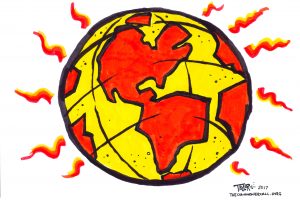
“I have no words to express my feelings.”
By Mary Pappenfuss
HuffPost (5/5/17)
The great thing about climate change is that there’s always some new, horrifying consequence to worry about ― like ancient viruses and bacteria emerging from the ice as the Earth warms. Unfortunately, researchers fear we may see more of this in the future.
Some of these viruses and bacteria may have been trapped for millennia, and it’s not even totally clear yet what they are, let alone what kind of damage they might cause.
Researchers have encountered complex “giant viruses” with as many as thousands of genes in the melting permafrost of Siberia. One such virus, 30,000 years old, was still infectious when it was discovered in 2015, though it posed no danger to humans, Live Science reports.
There are also concerns that some old enemies thought vanquished could reappear. It turns out that permafrost is excellent at preserving bacteria and viruses that can lie dormant, then become reactivated with warming.
Scientists have discovered intact Spanish flu viruses in corpses buried in 1918 in the Alaskan tundra. When close to half of the population of a Siberian town in the 1890s died of smallpox, their corpses were buried in the permafrost along the Kolyma River. The banks of that river are now beginning to erode amid global warming, the BBC reports.
An apparent demonstration of the danger occurred in Siberia last August, when some 100 people (and 2,300 reindeer) were infected with anthrax in the first outbreak in the area since 1941. One boy died from the disease. Scientists believe the anthrax had been trapped in a long-frozen reindeer carcass that thawed during global warming and the particularly hot summer of 2016, releasing the bacterial spores into the environment. …
(Commoner Call art by Mark L. Taylor, 2017. Open source and free for non-derivative use with link toe www.thecommonercall.org )

